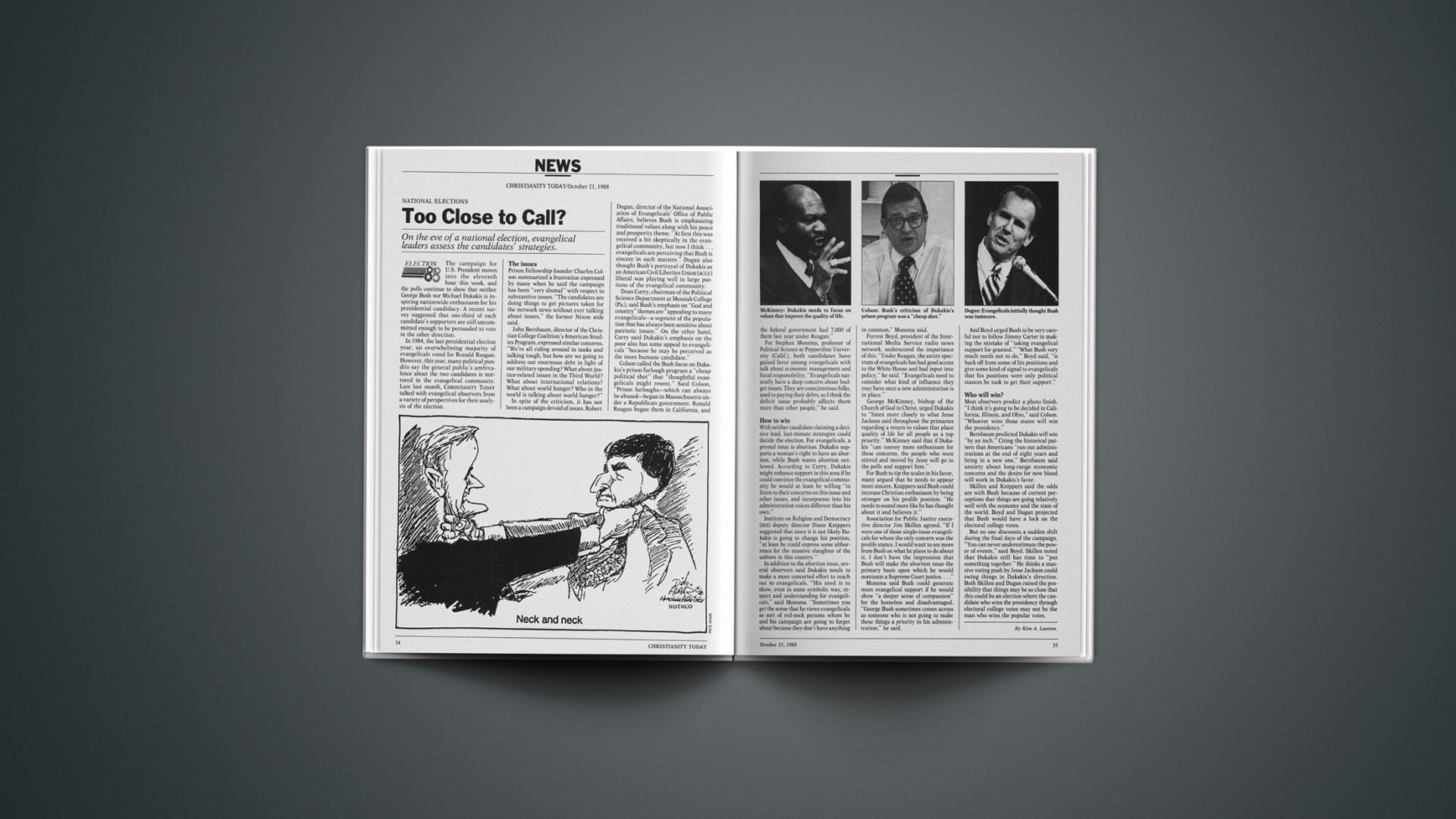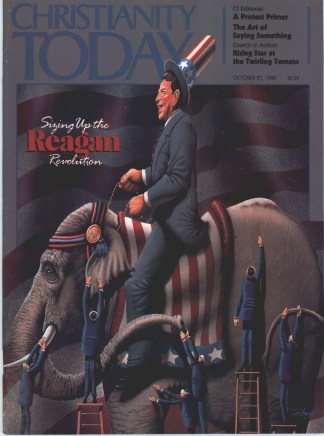NEWS
NATIONAL ELECTIONS
On the eve of a national election, evangelical leaders assess the candidates’ strategies.
The campaign for U.S. President moves into the eleventh hour this week, and the polls continue to show that neither George Bush nor Michael Dukakis is inspiring nationwide enthusiasm for his presidential candidacy. A recent survey suggested that one-third of each candidate’s supporters are still uncommitted enough to be persuaded to vote in the other direction.
In 1984, the last presidential election year, an overwhelming majority of evangelicals voted for Ronald Reagan. However, this year, many political pundits say the general public’s ambivalence about the two candidates is mirrored in the evangelical community. Late last month, CHRISTIANITY TODAY talked with evangelical observers from a variety of perspectives for their analysis of the election.
The Issues
Prison Fellowship founder Charles Colson summarized a frustration expressed by many when he said the campaign has been “very dismal” with respect to substantive issues. “The candidates are doing things to get pictures taken for the network news without ever talking about issues,” the former Nixon aide said.
John Bernbaum, director of the Christian College Coalition’s American Studies Program, expressed similar concerns. “We’re all riding around in tanks and talking tough, but how are we going to address our enormous debt in light of our military spending? What about justice-related issues in the Third World? What about international relations? What about world hunger? Who in the world is talking about world hunger?”
In spite of the criticism, it has not been a campaign devoid of issues. Robert Dugan, director of the National Association of Evangelicals’ Office of Public Affairs, believes Bush is emphasizing traditional values along with his peace and prosperity theme. “At first this was received a bit skeptically in the evangelical community, but now I think … evangelicals are perceiving that Bush is sincere in such matters.” Dugan also thought Bush’s portrayal of Dukakis as an American Civil Liberties Union (ACLU) liberal was playing well in large portions of the evangelical community.
Dean Curry, chairman of the Political Science Department at Messiah College (Pa.), said Bush’s emphasis on “God and country” themes are “appealing to many evangelicals—a segment of the population that has always been sensitive about patriotic issues.” On the other hand, Curry said Dukakis’s emphasis on the poor also has some appeal to evangelicals “because he may be perceived as the more humane candidate.”
Colson called the Bush focus on Dukakis’s prison furlough program a “cheap political shot” that “thoughtful evangelicals might resent.” Said Colson, “Prison furloughs—which can always be abused—began in Massachusetts under a Republican government. Ronald Reagan began them in California, and the federal government had 7,000 of them last year under Reagan.”
For Stephen Monsma, professor of Political Science at Pepperdine University (Calif.), both candidates have gained favor among evangelicals with talk about economic management and fiscal responsibility. “Evangelicals naturally have a deep concern about budget issues. They are conscientious folks, used to paying their debts, so I think the deficit issue probably affects them more than other people,” he said.
How To Win
With neither candidate claiming a decisive lead, last-minute strategies could decide the election. For evangelicals, a pivotal issue is abortion. Dukakis supports a woman’s right to have an abortion, while Bush wants abortion outlawed. According to Curry, Dukakis might enhance support in this area if he could convince the evangelical community he would at least be willing “to listen to their concerns on this issue and other issues, and incorporate into his administration voices different than his own.”
Institute on Religion and Democracy (IRD) deputy director Diane Knippers suggested that since it is not likely Dukakis is going to change his position, “at least he could express some abhorrence for the massive slaughter of the unborn in this country.”
In addition to the abortion issue, several observers said Dukakis needs to make a more concerted effort to reach out to evangelicals. “His need is to show, even in some symbolic way, respect and understanding for evangelicals,” said Monsma. “Sometimes you get the sense that he views evangelicals as sort of red-neck persons whom he and his campaign are going to forget about because they don’t have anything in common,” Monsma said.
Forrest Boyd, president of the International Media Service radio news network, underscored the importance of this. “Under Reagan, the entire spectrum of evangelicals has had good access to the White House and had input into policy,” he said. “Evangelicals need to consider what kind of influence they may have once a new administration is in place.”
George McKinney, bishop of the Church of God in Christ, urged Dukakis to “listen more closely to what Jesse Jackson said throughout the primaries regarding a return to values that place quality of life for all people as a top priority.” McKinney said that if Dukakis “can convey more enthusisam for these concerns, the people who were stirred and moved by Jesse will go to the polls and support him.”
For Bush to tip the scales in his favor, many argued that he needs to appear more sincere. Knippers said Bush could increase Christian enthusiasm by being stronger on his prolife position. “He needs to sound more like he has thought about it and believes it.”
Association for Public Justice executive director Jim Skillen agreed. “If I were one of those single-issue evangelicals for whom the only concern was the prolife stance, I would want to see more from Bush on what he plans to do about it. I don’t have the impression that Bush will make the abortion issue the primary basis upon which he would nominate a Supreme Court justice.…”
Monsma said Bush could generate more evangelical support if he would show “a deeper sense of compassion” for the homeless and disadvantaged. “George Bush sometimes comes across as someone who is not going to make these things a priority in his administration,” he said.
And Boyd urged Bush to be very careful not to follow Jimmy Carter in making the mistake of “taking evangelical support for granted.” “What Bush very much needs not to do,” Boyd said, “is back off from some of his positions and give some kind of signal to evangelicals that his positions were only political stances he took to get their support.”
Who Will Win?
Most observers predict a photo finish. “I think it’s going to be decided in California, Illinois, and Ohio,” said Colson. “Whoever wins those states will win the presidency.”
Bernbaum predicted Dukakis will win “by an inch.” Citing the historical pattern that Americans “run out administrations at the end of eight years and bring in a new one,” Bernbaum said anxiety about long-range economic concerns and the desire for new blood will work in Dukakis’s favor.
Skillen and Knippers said the odds are with Bush because of current perceptions that things are going relatively well with the economy and the state of the world. Boyd and Dugan projected that Bush would have a lock on the electoral college votes.
But no one discounts a sudden shift during the final days of the campaign. “You can never underestimate the power of events,” said Boyd. Skillen noted that Dukakis still has time to “put something together.” He thinks a massive voting push by Jesse Jackson could swing things in Dukakis’s direction. Both Skillen and Dugan raised the possibility that things may be so close that this could be an election where the candidate who wins the presidency through electoral college votes may not be the man who wins the popular votes.
By Kim A. Lawton.










